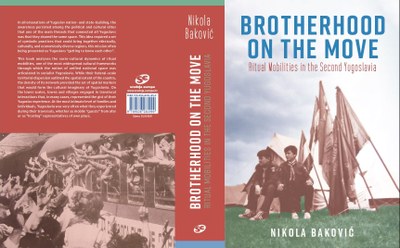Out now: Brotherhood on the Move. Ritual Mobilities in the Second Yugoslavia.

In all emanations of Yugoslav nation- and state-building, the awareness persisted among the political and cultural elites that one of the main threads that connected all Yugoslavs was that they shared the same space. This idea required a set of symbolic practices that could bring together ethnically, culturally, and economically diverse regions, this mission often being presented as Yugoslavs “getting to know each other”.
This book by Nikola Baković, former PhD student at GCSC, analyses the socio-cultural dynamics of ritual mobilities, one of the most widespread cultural frameworks through which the notion of unified national space was articulated in socialist Yugoslavia. While their federal-scale territorial dispersion outlined the spatial extent of the country, the density of its network provided the set of spatial markers that would form the cultural imaginary of Yugoslavia. On the lower scales, towns and villages engaged in translocal interactions that, in many cases, represented the gist of their Yugoslav experience. At the most intimate level of families and individuals, Yugoslavia was very often what they experienced during their traversals, whether as mobile “guests” from afar or as “hosting” representatives of own place.
In order to shed more light on the interconnection between ritual practices and the material and lived spaces of individual and collective actors, the project combines theoretical approaches of ritual studies (focused on the investigation of “ritual dynamics”, understood as diachronic changes and synchronic variations within ritual structures) with those of cultural geography, using the concept of place (imagined as the intersection of geographical positioning, material settings, and human action and experience). To fully examine multiple geographical and structural scales of the system of ritual mobilities, different examples will be scrutinised: the web of local-level marching trails of different social-political organisations that reenacted partisans’ wartime experience; republic-spanning amalgamation of commemorative and economic bonding between towns in Serbia and Slovenia through Train of Brotherhood and Unity; and the symbolic delineation of the whole federation through the system of Youth Relay Batons.
Online orders: https://srednja-europa.hr/proizvod/brotherhood-on-the-move-ritual-mobilities-in-the-second-yugoslavia/
